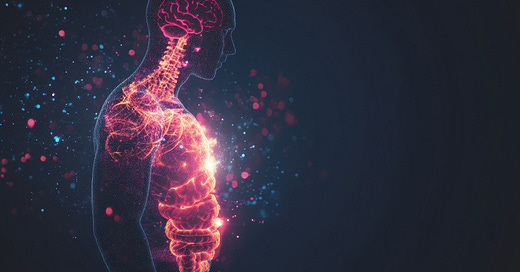Your Sunday Brain Mix: Your Brain Changes Your Gut Microbiome, Negative Expectations, and Personal vs Society Happiness
Last week I reported on how memories of the cold can change your fat metabolism, which is kind of cool.
This week I’ll start by looking at how the brain can change your gut microbiome - in as little as two hours!
Changing your gut microbiome
There has been increased research into the gut microbiome (and other ones such as on the skin) and this has been shown to have multiple effects on brain function and health:
Based on this, the advice is normally to eat various food that can stimulate and help your gut microbiome flourish such as a large variety of natural foods, foods high in fibre, and fermented foods such as kimchi and sauerkraut. The working premise is that this takes time to develop, days, weeks, months even - logically.
Imagine my surprise when I saw this piece of research, just out, that showed not only can your microbiome be influenced in as little as a few hours but that this can be directly stimulated by the brain!
That our brain is connected to and engages in two-way communication with the gut has been known for a long time and is well-documented. The brain helps trigger release of hormones and also receive satiety signals.
What Miriam Toledo et al. wanted to know was if the brain can impact the microbiome in the gut and to do this they used various drugs to inhibit or activate neurons in the brain’s hypothalamus. The hypothalamus is key center for communicating with the body and releasing hormones.
After treating the hypothalamus in these groups of mice they measured changes in the microbiome in four parts of the gut a few hours later. And lo and behold, to their own surprise and mine, they found that in as little as two hours, in the first part of the gut, for example, the duodenum, that the microbiome was significantly changed with a distinct microbal bloom. The diversity of gut bacteria was five times more diverse than in the control group that had not received any intervention!
They repeated this with another group of mice and found the same with, for example some populations of bacteria dropping by up to 99%. They also tried this by targeting appetite itself and not the hypothalamus directly and this also saw significant changes in the gut microbiome.
This will need to be complemented by studies into human beings but it dramatically changes how we think of the microbiome and the interaction with the body and the brain. How this functions is not clear but it is likely that appetite signals from the brain communicate to the gut and this operates as signalling mechanism to certain bacteria to activate or deactivate to help do their role in helping digestion.
And on this topic of brain to body communication and vice versa a new technique has been developed to scan and hence get more information on a region in the brainstem called the nucleus tractus solitarii (NTS) in living animals. The NTS, a vital relay for signals from organs via the vagus nerve, plays a key role in emotion regulation and overall mental health.
Another aspect of how the brain influences our body is in our expectations and new research has also shown how this impacts pain perception.
The impact of negative and positive expectation on pain
So we have long known that expectations have an impact on outcomes especially on pain perception. This is the famed placebo effect but there is also the negative twin: the nocebo effect - when a negative outcome is magnified.
These have been well-researched but, surprisingly, these have not been researched simultaneously. Enter Angelika Kunkel and research colleagues in a German and British collaboration. To do this they had the fun of giving a group 104 volunteers short bursts of heat pain and these were then told to expect either pain relief (placebo), increased pain (nocebo), or no change (control).
They did this with verbal cues i.e. just telling them what to expect, but also with a sham “nerve stimulation device”. These were measured at one week intervals but, the clever bit is that they also on repeating the exposure also in the first experiment, also subtly adjusted the level of the pain stimulus to match the expectation.
Then in the second experiment a week later they kept the pain stimulus the same - this was to then see how previous experience and expectation would match actual stimulus.
Keep reading with a 7-day free trial
Subscribe to leading brains Review to keep reading this post and get 7 days of free access to the full post archives.








